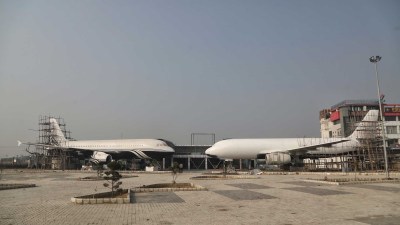Check-in on the tarmac
Air India operated its first special flight to Cairo to evacuate Indians stranded in the troubled country.
Vinod Angolkar had never flown in a near-empty plane before. Neither had he flown business class. Till that Sunday,when the 56-year-old deputy duty manager,a member of Air Indias ground staff at Mumbais Chhatrapati Shivaji Airport,was put on an unscheduled flight to Cairo. As the plane began to descend at 8.30 p.m. local time,Angolkar sat on the edge of his seat,his nose against the window,trying to spot the signs of chaos he had only just heard of. As the yellow lights of Cairo filtered in through the window of the dark plane,Angolkar remembers looking down at a deserted capital city. There wasnt a single person on the street,not one car on the roads, he says. President Hosni Mubarak had imposed a curfew in the cityfrom 4 p.m. to 8 a.m.and the airport area,Heliopolis,was one of the few parts of the capital where the curfew had been effective.
As millions took to the streets in protest against Mubaraks 30-year-old reign,Cairo International Airport was gridlocked. People spent nights at the airport,desperate to flee the chaos. On January 30,the Indian government decided to send a special Air India plane to Cairo to bring back Indians stranded in the city. And so,AI 800 made that journey.
Since no Indian carrier flies to Cairo,AI 800 was an unscheduled flight,which meant that there was no ground staff to usher the passengers into the plane. Its a job Angolkar has been doing for 31 years,so when he got a call that Sunday at the end of his eight-hour shift,asking if he would go to Cairo to check in passengers,he agreed.
It had already been a long day for Angolkar. He had just reached home when he got that call. He left a message for his childrena son and a daughter,who were both working that weekendsaying he was going back to work,but didnt tell them the Cairo bit. When he got back to Mumbai airport,cartons with Air India stationaryboarding passes and hand baggage tagswere being loaded onto AI 800. So was the foodchicken and vegetable biryani. As the plane readied for take-off at 4.30 p.m.,sank into his seat,loosened his red tie with the Air India logo on it and tried to get some sleepit was a six-hour journey.
AI 800 touched down at Cairo at 8.30 p.m. It found a taxing spot easily but there was no free check-in counter available. Airlines from across the world were inundated with calls to get people out, he says.
AI 800s ground staff had to wait on the tarmac as entry into the terminal was prohibited. Angolkar submitted a list of passengers to an embassy official and two officials from Egypt Air,the only airline that flies from Egypt to India. He also handed them the cartons with the boarding passes and the tags.
It was on the tarmac that Angolkar found out about the events in Cairo. He spoke a smattering of Arabic,a language he learnt while he was posted in Doha,Dubai and Bahrain when Air India was starting operations there. The Eygptian staff on duty spoke of how they too were stuck at the airport because the curfew wouldnt allow any movement out.
Angolkar stood dwarfed under the plane,holding on to his passenger list,which had changed several times over that day. The aircraft was to fly 420 people but only 318 made itsome were held up because of the curfew. After a wait of about six hours,Air India finally got a slot to check in passengers. While the immigration formalities were done by Egypt Air and the Indian embassy staff in Cairo,it was Angolkar who did the restchecking the passenger list and tallying it with the boarding passes. He also had to check the tags and monitor the cargo (a task he normally delegates to others while in Mumbai). The main worry was that passengers would exceed their baggage limit but thankfully,that didnt happen, he says.
Rows of tired passengers made their way to the plane. Some of the passengers told him that they had come in early and had slept on the floor of the airport. An elderly woman cried when she saw him. She held my hand and cried. I wondered,what was going on here? he says.
At 6 a.m. on Monday,as AI 800 taxied on the runway,preparing to take off to Mumbai,the passengers clapped and cheered spontaneously. They knew they were going home, says Angolkar. The mood on board was suddenly relaxedpassengers chatted with each other and they clapped again when they heard they would be served biryani.
Later that evening,after a 36-hour duty,Angolkar finally met his children. They had tried contacting him but couldnt get through. They were appalled hed gone to Egypt,though Angolkar is happyit was an opportunity, he says. Only he wishes he could have seen the pyramids. But after all,Egypt was shut, he says.
Air India continues to evacuate Indians from Cairo and Angolkar is now back at work in Mumbai,checking passengers in,this time not on the tarmac.


- 01
- 02
- 03
- 04
- 05





























